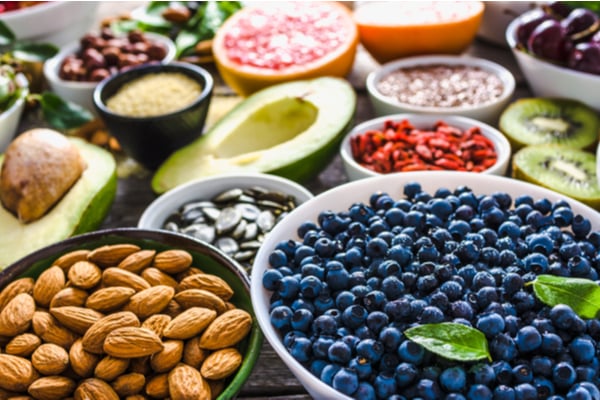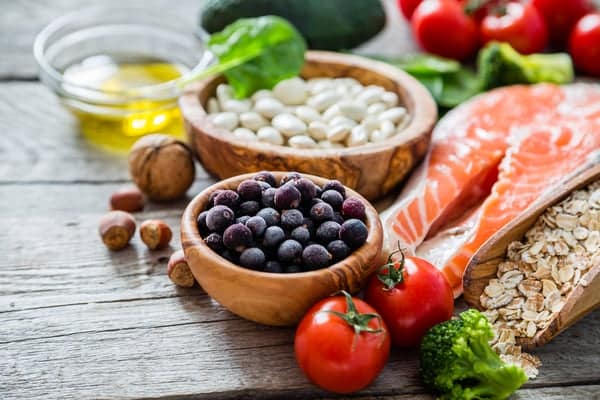Inflammation is your body’s natural response to foreign substances. It’s the way that your immune system defends and protects you from viruses, bacteria, infections, and materials that may harm you.
The inflammatory response is one of the first steps that your body takes on the way to healing.
There are two main types of inflammation, acute and chronic. Acute inflammation is what takes place when a mosquito bite swells, a rash develops from poison ivy, or you spike a fever from a cold. Acute inflammation is usually marked by redness, heat, or pain as your body works to eliminate harmful agents and damaged tissue. Acute inflammation surfaces quickly and generally subsides quickly, too.
Chronic inflammation, on the other hand, is a lot less visible and can wreak long-term havoc within your body. Recent research indicates that chronic inflammation causes and advances many common diseases. Chronic inflammation can exist within the body for months or years on end, leading to debilitating conditions, like arthritis (inflammation of the joints) or heart disease (inflammation of the arteries), and contributing to severe conditions, like asthma and other autoimmune conditions.
Chronic inflammation builds up as the result of a series of lifestyle choices. Everything from the foods that you eat to the way that you manage stress all play a part in chronic inflammation. Of course, there are medications to help manage symptoms of inflammatory conditions (usually steroids or NSAIDs, depending on the particular condition), but a more sustainable and effective treatment is to reduce inflammation from the source.
Knowing the conditions that exacerbate chronic inflammation provides a clear path toward taking steps to reduce inflammation. One of the most significant contributors to chronic inflammation is the food that we eat. Here is a list of some of the most inflammatory foods and what you should look for as you seek to avoid them. As you’ll notice, many foods on this list are typically found in convenient, processed foods. By choosing whole, unprocessed foods, you’ll make tremendous strides away from inflammatory foods.
What foods cause inflammation?
1. Sugar
In any of its forms—glucose (table sugar), fructose (found in fruits), as high fructose corn syrup or any other more cleverly disguised form. Sugar increases inflammation and can hinder the anti-inflammatory effects that omega-3s usually bring about.
Several studies have shown that ingesting sugar increases inflammatory markers in mice and also in humans. Sugar is also linked to obesity caused by insulin resistance (a precursor to diabetes), fatty liver, cancer, and chronic kidney diseases.
Sugar is found in a lot of different places, often hidden. On ingredient labels, look for ingredients that end in -ose, like dextrose, glucose, etc., as they all impact your blood sugar and predispose you to sever inflammation. Cookies, cereals, candy, and desserts of all kinds have lots of sugar. If you need a sweet treat, opt for low sugar options, like dark chocolate, or low sugar fruits that are high in fiber, like berries.
2. Refined Carbohydrates
Grains, in general, are often linked with inflammation in the body. Refined carbohydrates, however, are especially dangerous. These are essentially grains that have been stripped of their fiber. Without fiber, they have a particularly high glycemic load—they’ll raise your blood sugar.
Research shows that these foods drive inflammation. Foods like candy, bread, cakes, cookies, pasta, and sodas all have sugar or flour. When consumed frequently, these foods promote the growth of inflammatory gut bacteria. This overgrowth, in turn, increases the likelihood of obesity and inflammatory bowel disease.
These foods generally lack color—think white bread and pasta. If you must include grains in your diet, make sure that they are whole grains, like brown rice or whole wheat. The fiber in them helps you to feel full, feeds helpful digestive bacteria, and tempers the impact on your blood sugar.
For a large number of people, it may be helpful to avoid grains or certain types of grains altogether. Gluten, for example, found in flour and rice, can be highly inflammatory for intolerant individuals or those with Celiac’s disease.
To avoid gluten, opt for any of the gluten-free choices that use alternatives like potato or garbanzo bean or nut flours to avoid triggering inflammation in sensitive individuals.
3. Dairy
Many people react negatively to dairy products due to lactose intolerance or casein sensitivity. For many, merely avoiding dairy products can reduce symptoms of arthritis or other inflammatory conditions rather quickly.
Feel free to explore lactose-free alternatives, like nut milk, or consider other dairy sources. Goat dairy products are also a viable alternative. Goat milk has significantly less lactose and casein and is easier to digest and less inflammatory than cow’s milk.
4. Trans fats
These unnatural saturated fats trigger an inflammatory response in your body. You’ll find trans fats in fried and fast foods. Trans fats are also hiding in many processed snack foods in shortening and margarine. Anywhere you see the words “partially hydrogenated oil,” you should head in the opposite direction.
Manufacturers take unsaturated fats and add hydrogen to them so that they become solid. In that form, these fats are more shelf-stable. Unfortunately, trans fats have been linked to cause inflammation and increase the risk of disease. Trans fats appear to damage the endothelial cells that line arteries, contributing to cardiovascular disease. Trans fats also seem to impact HDL (good cholesterol) levels negatively.
People who consume trans fats also have significant levels of inflammatory markers, like C-reactive protein (CRP). To avoid trans fats, steer clear of processed convenience foods. You’re a lot less likely to come across hydrogenated oils if you cook your food.
5. Vegetable and Seed Oils
Certain vegetable oils, including corn, safflower, sunflower, soy, and peanut oils, are very high in omega-6 fatty acids. Omega-6 fatty acids are beneficial in moderation but can prompt the body to produce inflammatory compounds that are associated with nonalcoholic fatty liver and cardiac disease, arthritis, and other common chronic ailments.
Our modern diet includes more of these oils than ever before, so avoid them when you can. Seek out high-quality plant or animal fats, like olive oil. Some suggest that consuming foods high in omega-3s (which are anti-inflammatory) can help to counter this inflammation.
6. Alcohol
Excess consumption of alcohol overloads your organs and can cause inflammation on several levels. To begin with, it taxes your liver and leads to higher levels of CRP inflammatory compounds. Heavy drinkers may also develop a “leaky gut,” which is caused by bacteria, toxins, and undigested food escaping from the colon and permeating the body. It’s best to limit your alcohol consumption to avoid inflammation.
Get Your Free Guide to the Top 50 Anti-Inflammatory Foods
What can you do to counter inflammation?
Be mindful of what you eat.
Many of the foods that trigger inflammation are modern, convenient foods. By choosing to eat whole foods, you automatically eliminate many of the culprits that we discussed above. By cooking what you eat, you have the ultimate control over what you put in your body.
In addition to avoiding inflammatory foods, you can also incorporate anti-inflammatory foods. Consuming fruits, vegetables, and healthy fats, like coconuts and avocados, and foods high in omega-3s will work to reduce inflammation in your body. Adding herbs and spices, like ginger or turmeric, can also relieve inflammation. Consuming fresh fruit and vegetable juices, teas, and plenty of water will also help your body achieve a healthy balance.
Learn how to manage stress.
One of the most important components of chronic inflammation is stress. In today’s busy, fast-paced world, it is easy to wind up in a state of constant stress, which only exacerbates inflammation.
Cultivating a calm, peaceful environment is a great place to start. Minimize clutter. Meditate to clear your mind. Breathe deeply. Put your phone away.
Exercise
The way that you fuel your body is important, but it is also imperative to incorporate healthy movement. A sedentary lifestyle provides ideal conditions for fostering inflammation, so make sure to get active. If outside activity is an option, go for a walk, hike, or bike ride. Simply moving can help.
Sleep
Prioritize your sleep hygiene. This is when the body rests and recovers, so make sure that you get to bed in time to get the sleep you need. To ensure sleep quality, get blackout curtains, soft sheets, or whatever you need to get comfortable and sleep deeply.
Detoxify
Inflammation can also be caused by environmental toxins. Caustic cleaners, for example, can irritate your lungs, so work toward using more natural ingredients around the home. Some individuals with severe allergies may find scented products, like candles and perfumes, triggering, so opt for products that are free of dyes and fragrances if you can.
We come into contact with so many toxins on a regular basis. While you can’t successfully avoid them all (unless you live in a bubble), keeping your air filters clean and dusting and vacuuming regularly will all help to keep your air clean.
Conclusion
Chronic inflammation is at the root of many serious and debilitating diseases. The prevalence of conditions linked to inflammation can be attributed in large part to the modern conveniences that we enjoy. Packaged, processed foods that are ready to eat are laden with sugar, refined carbohydrates, hydrogenated oils, and vegetable oils.
Consuming these types of foods, along with excessive alcohol and, for many, dairy products, can trigger the body into releasing inflammatory substances. As a result, the very mechanism designed to protect your body from harm causes it to malfunction.
Thankfully, avoiding these triggers and relieving your immune system are within reach. Buying and cooking whole foods that are low in sugar and full of fiber and healthy fats will help you circumvent most of the foods on this list. For the rest, consider dairy alternatives and limit your alcohol consumption to prevent leaky gut.
The other part of the inflammation battle is to counteract modern lifestyle factors that keep the body in a constant state of stress. Be mindful of what stresses you out and work to mitigate those issues. Cultivate a safe, clean environment that allows you to relax and recover from life as we know it.
With these tools, you’ll be well on your way toward reducing the inflammation that plagues so many of us. It’s ironic, really, that this modern way of living is actually causing us to go back to our roots for the sake of our health.




